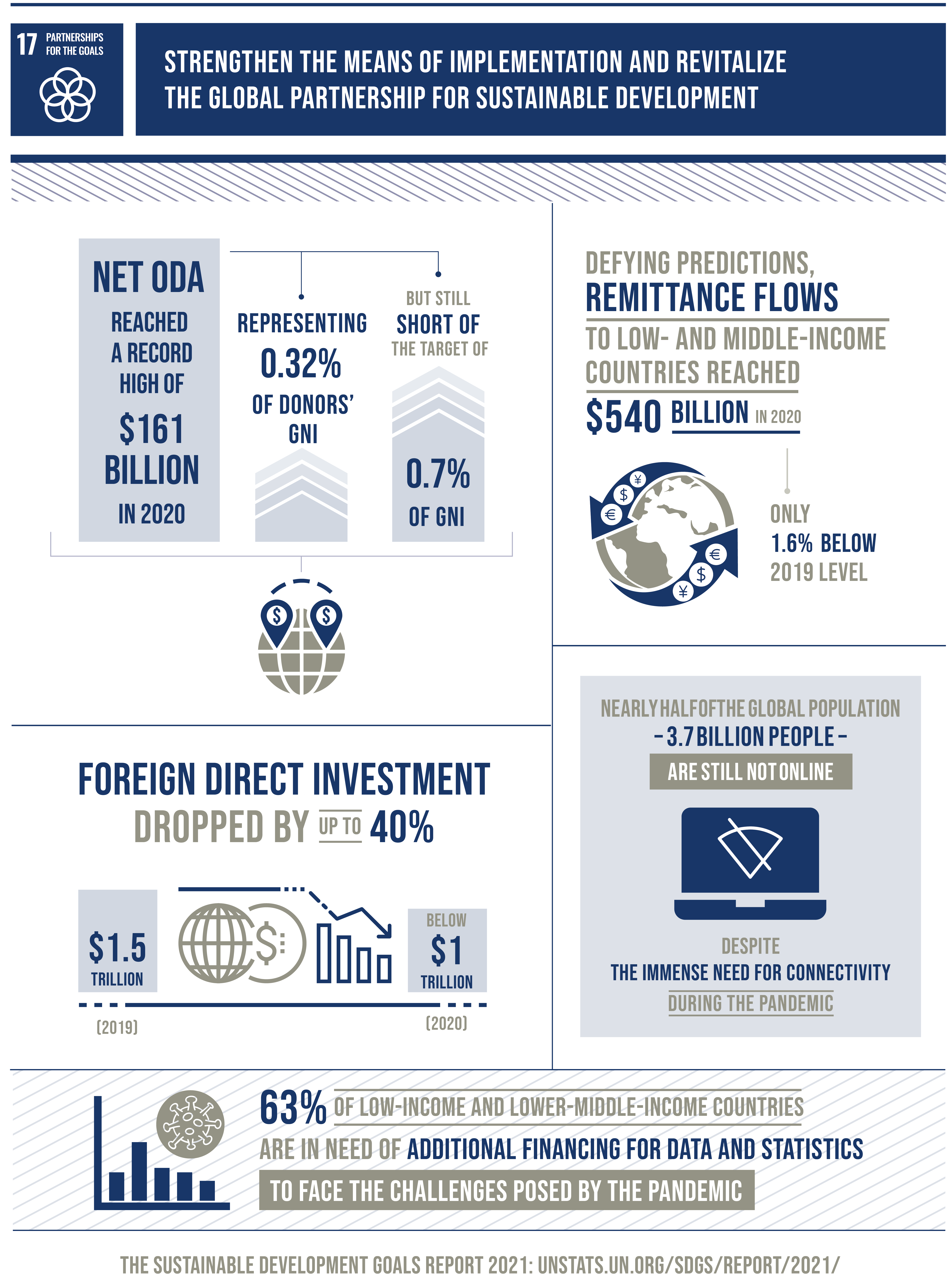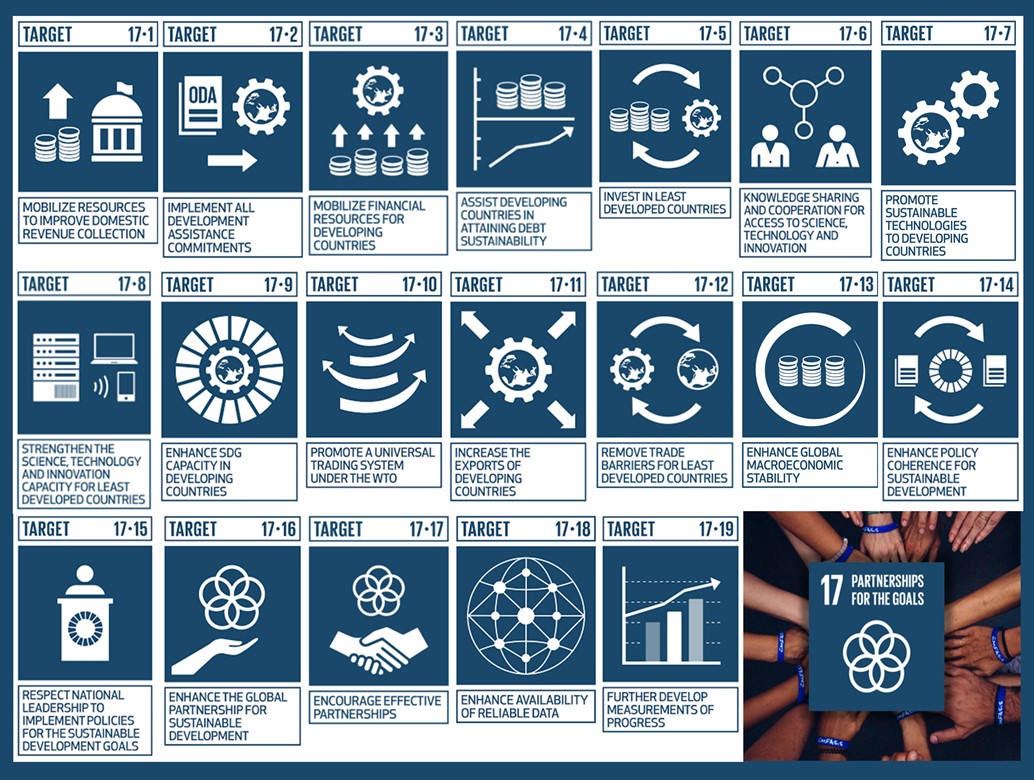Driving progress together
How the Jameel Family’s collaborative approach aligns with the UN vision of partnership to achieve the Sustainable Development Goals
![]() The United Nations’ (UN) Sustainable Development Goals (SDGs) are a blueprint to achieve a better and more sustainable future for all. They address the global challenges we face, including poverty, inequality, climate change, environmental degradation, and peace and justice – and they define the actions we need to take, as a society, to safeguard the future of our way of life, and of our planet.
The United Nations’ (UN) Sustainable Development Goals (SDGs) are a blueprint to achieve a better and more sustainable future for all. They address the global challenges we face, including poverty, inequality, climate change, environmental degradation, and peace and justice – and they define the actions we need to take, as a society, to safeguard the future of our way of life, and of our planet.
The 17 Goals were adopted by all UN Member States in 2015, as part of the 2030 Agenda for Sustainable Development[1], which set out a 15-year plan to achieve the Goals.
Today, progress is being made in many places, but, overall, action to meet the Goals is not yet advancing at the speed or scale required[2]. At the UN SDG Summit, Antonio Guterres, UN Secretary-General, called on all sectors of society to mobilize for a decade of action to try and keep the Goals on track[3].

“We need all hands-on deck. We need to move together, in step with the world’s young people, leaving no one behind. Let us harness the wind in the sails from this Summit to move faster and farther to reach our destination for people and planet,” said Guterres.
Most of the Goals set out priority actions we need to take, which, if achieved, will help to resolve that issue and enable us to reach that destination, whether it be reducing poverty, improving access to food and water, or cutting CO2 emissions.

But SDG 17: Partnerships for the goals, is different. Rather than setting out what actions we need to take, it outlines how we should take them in order to be successful in our aims. It emphasizes that the SDGs can only be realized with strong global partnerships and cooperation.
SDG 17 states: “A successful development agenda requires inclusive partnerships — at the global, regional, national and local levels — built upon principles and values, and upon a shared vision and shared goals placing people and the planet at the centre…Strong international cooperation is needed now more than ever to ensure that countries have the means to recover from the pandemic, build back better and achieve the Sustainable Development Goals”[4].
The COVID-19 pandemic has focused attention even more on the crucial role of global partnerships. The interconnected global economy requires a global response to ensure that all countries and territories, in particular developing countries, can address the parallel health, economic and environmental crises in order to recover better.
Our long history of partnership
This spirit of partnership has been at the heart of the Jameel Family’s approach to both commercial and philanthropic endeavors for over 75 years.
Since our founder Abdul Latif Jameel opened his first filling station in 1945 – the same year as the UN itself was established – the Jameel Family has built diverse and wide-ranging alliances across the globe based on respect, shared values and a mutual vision of creating tangible value for the future of human society. This strengthens both our business and enables our ability to innovate for a better future. This is even more true in our partnerships to collectively and materially contribute to the UN SDGs.

Through our continued investment in the ‘infrastructure of life’ around the world, from food systems to energy; education to health – we continue to be committed to supporting a fairer, greener, more prosperous future for all, striving for solutions to some of the most challenging questions facing humanity, and our planet.
The reach and impact already achieved would be impossible without the commitment, expertise and resources of our partners — from business alliances to our clients; from suppliers to non-governmental organizations; from science to academia; and also, in our investments.
Through our businesses and philanthropies, we partner with international bodies, corporations, innovators, universities, municipal leaders, community organizations, arts foundations and youth groups.
Our success – and our contribution to global efforts to achieve the SDGs – depends on these mutually beneficial partnerships and alliances.
Driving progress through partnership
Our oldest partnership dates back to the very earliest days of Abdul Latif Jameel, when our founder opened his first automotive outlet in Jeddah. He partnered with an up-and-coming Japanese brand called Toyota and helped to pioneer mass mobility – an enabler to economic growth – in Saudi Arabia, in the process. Our partnership with Toyota later saw us play a key role in driving the development and popularity of new, sustainable models of automotive mobility in the MENAT region, such as the comprehensive Toyota and Lexus hybrid vehicles and the Toyota Mirai hydrogen-powered vehicle.
This commitment to sustainable mobility led the Jameel Family to become early investors in electric vehicle disruptor, RIVIAN and all-electric eVTOL aerial ridesharing business Joby Aviation.
As well as passenger vehicles, we have expanded our partnership approach into other areas of transportation such as commercial vehicles, equipment and logistics, collaborating with brands including Hino trucks, Toyota Industrial Equipment, Raymond materials handling, Komatsu mining and construction solutions, Manitou, and a range of power generation solutions serving the construction sector.

Building a more sustainable future
Abdul Latif Jameel Energy and Environmental Services is applying this partnership approach with great success across a range of sectors that are integral to the infrastructure of life, including water and clean energy.
Almar Water Solutions, for example, a specialist provider of technical capabilities for water infrastructure development, partners with solutions providers and authorities across the globe to improve access to our planet’s most precious resource, water, through investment in treatment and recycling and sustainable desalination projects.
The company has a major stake in the Muharraq wastewater treatment plant in Bahrain, and in 2019, as part of consortium of partners, Almar Water was awarded the contract to develop one of the world’s largest desalination plants, the now award-winning Shuqaiq 3 IWP on the Red Sea cost of Saudi Arabia.
Almar is also rapidly expanding its operations in Latin America, in particular Chile, where it is involved in a number of water development projects in conjunction with local partners. Similarly, in Egypt, where 7.3 million people have no access to safe drinking water and 8.4 million are deprived of proper sanitation, it is partnering with HA Utilities to develop wastewater management projects across the country.
As Almar Water Solutions is doing in the water sector, so Fotowatio Renewable Ventures (FRV) is doing in the renewable energy sector, working with partners across the globe to deliver clean and affordable energy to millions of homes. Its dedicated innovation arm, FRV-X, is also taking a collaborative approach to pushing forwards the boundaries of clean energy. In partnership with Harmony Energy, it is pioneering the development of utility-scale battery storage in the UK, with two projects ay Holes Bay and Contego. It is also involved in two ground-breaking public mobility partnerships in Spain that seek to bring the benefits of hydrogen-powered transportation to a wider audience.
Working for health equality
The Jameel Family has a long history of investing in the healthcare sector, where the costs, complexity and strict regulatory frameworks mean it is one area where a partnership approach can be particularly beneficial.
Abdul Latif Jameel Health focuses on accelerating access to modern medical care while addressing unmet medical needs in developing markets around the world. Founded in 2020, it has already completed a number of key deals with partners like Evelo Biosciences, Cellarity and Japanese MedTech innovators Melody International, Cellspect and Holoeyes, to bring the next generation of health technologies to people in underserved markets across the globe.
At the other end of the scale, Community Jameel, the global philanthropy of the Jameel Family, partners with leading academic institutions across the globe to support the kind of ground-breaking research and innovation that is necessary to develop such next generation healthcare technologies.
The Jameel Institute (Abdul Latif Jameel Institute for Disease and Emergency Analytics) co-founded by Community Jameel and Imperial College London, uses AI and novel data analytics to reduce global risk of preventable disease risk. Most recently, this has included the COVID-19 pandemic, and strengthening public health systems in the most fragile settings.
In the United States, the Jameel Clinic (Abdul Latif Jameel Clinic for Machine Learning in Health) was co-founded by MIT and Community Jameel in September 2018 and has rapidly become the very epicenter of AI and healthcare at MIT. It focuses on using AI to model biological data across modalities such as imaging, text and genomics, and making new discoveries in machine learning, biology, chemistry and clinical sciences.
The great quest for knowledge – pushing the boundaries of research and education
Community Jameel has two further partnerships focusing on similarly critical areas to global development. The Jameel Water and Food Systems Lab (J-WAFS) funds breakthrough research, innovation and technology to ensure safe, resilient food and water supplies with minimal environmental impact, while the Abdul Latif Jameel World Education Lab (J-WEL), established in 2017, works with member organizations to promote excellence and transformation in education worldwide and address global opportunities for scalable change in education.
Education is also the driver behind a number of other Community Jameel partnerships. These include two scholarship programs to enable promising students from across the globe to benefit from a high-quality education that may otherwise be inaccessible.
The most recent, established in 2019, is the Andrea Bocelli Foundation-Community Jameel Scholarship, which supports students who study full-time at the Royal College of Music, London, one of the world’s leading conservatoires for the performing arts. The second is the Abdul Latif Jameel-Toyota Endowed Scholarship, which celebrated its 25th anniversary in 2019, and continues to help young people achieve their potential at MIT, one of the world’s leading academic institutions.
Other initiatives include Transforming Refugee Education towards Excellence (TREE), a collaboration between Save the Children and J-WEL, which helps teachers overcome trauma and deliver effective teaching, and Tanweer Jameel, which works with Saudi Arabia’s Ministry of Labor and Saudi Airlines to reward high-achieving orphaned children with an annual trip abroad.
In the cultural sphere, meanwhile, collaboration is at the heart of Art Jameel’s program and way of working. Its major institutional partners include the Victoria and Albert Museum The Metropolitan Museum of Art, the Delfina Foundation and the Prince’s School of Traditional Arts. Locally, the foundation works with individuals and organizations to develop innovative programming that embraces both ancient and new technologies, and encourages entrepreneurship and the development of cultural networks.
Towards a more beautiful tomorrow . . .
These partnerships, among many others, provide a glimpse of how our work both aligns with, and is helping to deliver, SDG 17. Together, we are looking beyond and working to innovate for a better future.
Learn more about how the Jameel Family’s activities are contributing to the Sustainable Development Goals by visiting: https://jameel75.com/sdg to watch our video and download a summary report.
[1] https://www.un.org/ga/search/view_doc.asp?symbol=A/RES/70/1&Lang=E
[2] https://unstats.un.org/sdgs/report/2019/
[3] https://www.un.org/sg/en/content/sg/speeches/2019-09-24/remarks-high-level-political-sustainable-development-forum
[4] https://www.un.org/sustainabledevelopment/globalpartnerships/





 1x
1x

 Added to press kit
Added to press kit


